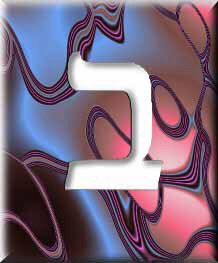
BEIT
Purpose: God's Dwelling Place Below
The letter beit, from the word "house," refers to God's house: "My house will be called a House of Prayer for all peoples." The Midrash states that the Divine motivation for creation was that the Holy One, Blessed Be He, desired a dwelling place in lower reality. The fulfillment of this desire begins with the creation of man, a Divine soul enclothed in a physical body, and proceeds with the multiplication of man, to "conquer" the whole world and make it the kingdom of God.
The Torah precedes the detailed description of the Tabernacle and its vessels with the statement of its ultimate purpose: "They shall build me a Temple and I will dwell in them." Not "in it," the Sages explain, but "in them"--in each and every Jew. "Dwelling in them" is, in essence, the revelation of Divinity in the people of Israel, ever present but often "shadowed," as in the time of exile and destruction of the Temple. The innate sanctity of the people of Israel, the "sanctuary of God," when revealed and linked to that of the land of Israel, causes the Holy Land to expand and eventually encompass all the earth (lower reality): "the land of Israel will in the future spread out to all the lands of the earth."
Beit is numerically equal to the word "ta'avah," which means "desire" or "passion" (412). In general, "ta'avah" connotes a negative human property. However, in several places "ta'avah" denotes the positive passion of the tzadik, the righteous man. One passage in Proverbs states: "He will fulfill the passion of the tzadik," and a second says: "the passions of tzadikim are only good." The "ta'avah" of G-d, the "Tzadik of the world," is altogether above reason and logic. At this level one cannot ask "why." As expressed by Rabbi Shneur Zalman of Liadi: "About passion, there can be no question." As G-d is the essence of good so His passion is "only good." is numerically equal to the word "ta'avah," which means "desire" or "passion" (412). In general, "ta'avah" connotes a negative human property. However, in several places "ta'avah" denotes the positive passion of the tzadik, the righteous man. One passage in Proverbs states: "He will fulfill the passion of the tzadik," and a second says: "the passions of tzadikim are only good." The "ta'avah" of God, the "Tzadik of the world," is altogether above reason and logic. At this level one cannot ask "why." As expressed by Rabbi Shneur Zalman of Liadi: "About passion, there can be no question." As God is the essence of good so His passion is "only good."
"With whom did the Holy One, Blessed be He, take counsel whether or not to create the world? With the souls of the tzadikim." The "souls of the tzadikim" refers to all Jewish souls, as is said: "All your people are tzadikim." God's connotation as the "Tzadik of the world" refers to the absolute origin and unity of the Jewish soul in His very Essence. When the soul descends to be enclothed in the finite consciousness and experience of a seemingly mundane body, its task is to become the tzadik below in true emulation of its Source, the "Tzadik Above." This is accomplished through the refinement and purification of passion, ta'avah, to become "only good."
The "Tzadik Above" dwells in the House built for Him by the tzadik below. Here, the deepest passion of the Creator reaches fulfillment. The large beit, the first letter of the Torah and the beginning of Creation, expresses this ultimate purpose, as is said: "The final deed arose first in thought." In the first word of the Torah, Bereishit, the three "servant" letters--the prefix beit" and the two suffix letters, yud and tav - spell bayit, "house" (equivalent to the full spelling of the letter beit). The root of "bereishit," rosh, means "head." Thus the most "natural" permutation of bereishit reads: rosh bayit, "the head of the house." One permutation of the letters rosh is osher, "happiness." When the tzadik draws God, the "Head," into His House, it becomes a house of true and eternal happiness.
The drawing down of the "Head" to dwell in His "House" below, in true happiness, is the secret of bracha, "blessing," which begins with the letter beit. Our Sages teach that the "big beit" begins the Creation, and the Torah as a whole, with the power of blessing. God blesses His creation, which He creates with the attribute of lovingkindness, the attribute of Abraham, as will be explained in the letter hei. Abraham, the first Jewish soul, is subsequently entrusted with the Divine power of blessing, the "big beit" of Creation, as is said: "And you shall be [the one who bestows] blessing." Afterwards, at the time of his circumcision, he was given the "small hei" of Creation, the power to draw down and manifest the Divine blessing of happiness in the smallest detail of reality.
The Priestly Blessing is composed of three verses. The number of words progress in the order 3, 5, 7, with equal differences of two, beit. The number of letters progress in the order: 15, 20, 25, with equal differences of five, hei. Words represent full, or large consciousness, whereas letters represent particular, or small consciousness. The power to bless "fullness" is the power of the beit, as is said: "And full with the blessing of God." The power to draw down the blessing to the smallest detail of reality is that of hei.
This service of Abraham, and all Jews after him, leads to the fulfillment of the ultimate intention of Creation, the realization of Israel's power of blessing, that the domain of the King (the "Head of the House") extend to encompass all reality and, thereby, bestow true happiness to all.







